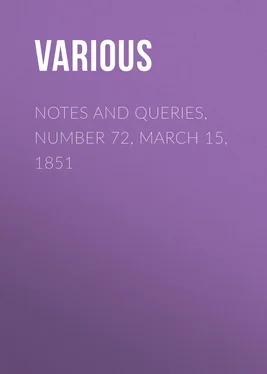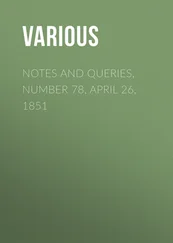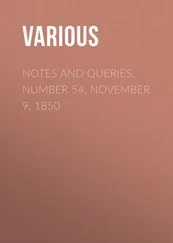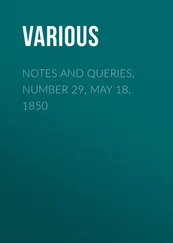Various - Notes and Queries, Number 72, March 15, 1851
Здесь есть возможность читать онлайн «Various - Notes and Queries, Number 72, March 15, 1851» — ознакомительный отрывок электронной книги совершенно бесплатно, а после прочтения отрывка купить полную версию. В некоторых случаях можно слушать аудио, скачать через торрент в формате fb2 и присутствует краткое содержание. Жанр: foreign_antique, periodic, foreign_edu, на английском языке. Описание произведения, (предисловие) а так же отзывы посетителей доступны на портале библиотеки ЛибКат.
- Название:Notes and Queries, Number 72, March 15, 1851
- Автор:
- Жанр:
- Год:неизвестен
- ISBN:нет данных
- Рейтинг книги:3 / 5. Голосов: 1
-
Избранное:Добавить в избранное
- Отзывы:
-
Ваша оценка:
- 60
- 1
- 2
- 3
- 4
- 5
Notes and Queries, Number 72, March 15, 1851: краткое содержание, описание и аннотация
Предлагаем к чтению аннотацию, описание, краткое содержание или предисловие (зависит от того, что написал сам автор книги «Notes and Queries, Number 72, March 15, 1851»). Если вы не нашли необходимую информацию о книге — напишите в комментариях, мы постараемся отыскать её.
Notes and Queries, Number 72, March 15, 1851 — читать онлайн ознакомительный отрывок
Ниже представлен текст книги, разбитый по страницам. Система сохранения места последней прочитанной страницы, позволяет с удобством читать онлайн бесплатно книгу «Notes and Queries, Number 72, March 15, 1851», без необходимости каждый раз заново искать на чём Вы остановились. Поставьте закладку, и сможете в любой момент перейти на страницу, на которой закончили чтение.
Интервал:
Закладка:
Various
Notes and Queries, Number 72, March 15, 1851 / A Medium of Inter-communication for Literary Men, Artists, Antiquaries, Genealogists, etc
Notes
ILLUSTRATIONS OF CHAUCER
I am glad to perceive that some of the correspondents of "Notes and Queries" are turning their attention to the elucidation of Chaucer. The text of our father-poet, having remained as it were in fallow since the time of Tyrwhitt, now presents a rich field for industry; and, in offering free port and entry to all comments and suggestions, to be there sifted and garnered up, the pages of "Notes and Queries" may soon become a depository from which ample materials may be obtained for a new edition of Chaucer, now become an acknowledged desideratum.
One excellent illustration has lately been added, at page 133., in a note without signature upon "Nettle in, dock out." If confirmed 1 1 [Of which there can be no doubt. See further p. 205. of our present Number.—Ed.]
, it will furnish not only a most satisfactory explanation of that hitherto incomprehensible phrase, but also a curious example of the faithful preservation of an exact form of words through centuries of oral tradition.
And if the note which precedes it, at page 131., upon a passage in Palamon and Arcite, is less valuable, it is because it is deficient in one of the most essential conditions which such communications ought to possess—that of originality. No suggestion ought to be offered which had been previously published in connexion with the same subject: at least in any very obvious place of reference, such as notes or glossaries already appended to well-known editions of the text.
Now the precise explanation of the planetary distribution of the twenty-four hours of the day, given by ε. in the first portion of his communication, was anticipated seventy or eighty years ago by Tyrwhitt in his note upon the same passage of Palamon and Arcite. And with respect to ε.'s second explanation of the meaning of "houre inequal," that expression also has been commented upon by Tyrwhitt, who attributes it to the well-known expansive duration of ancient hours, the length of which was regulated by that of the natural day at the several seasons of the year: hence an inequality always existed; except at the equinoxes, between hours before, and hours after, sunrise. This is undoubtedly the true explanation, since Chaucer was, at the time, referring to hours before and after sunrise upon the same day. On the contrary, ε.'s ecliptic hours, if they ever existed at all (he has cited no authority), would be obviously incompatible with the planetary disposition of the hours first referred to.
I shall now, in my turn, suggest explanations of the two new difficulties in Chaucer's text, to which, at the conclusion of his note, ε. has drawn attention.
The first is, that, "with respect to the time of year at which the tournament takes place, there seems to be an inconsistency." Theseus fixes "this day fifty wekes" from the fourth of May, as the day on which the final contention must come off, and yet the day previous to the final contention is afterwards alluded to as "the lusty seson of that May," which, it is needless to say, would be inconsistent with an interval of fifty ordinary weeks.
But fifty weeks, if taken in their literal sense of 350 days, would be a most unmeaning interval for Theseus to fix upon,—it would almost require explanation as much as the difficulty itself: it is therefore much easier to suppose that Chaucer meant to imply the interval of a solar year. Why he should choose to express that interval by fifty, rather than by fifty-two, weeks, may be surmised in two ways: first, because the latter phrase would be unpoetical and unmanageable; and, secondly, because he might fancy that the week of the Pagan Theseus would be more appropriately represented by a lunar quarter than by a Jewish hebdomad.
Chaucer sometimes makes the strangest jumble—mixing up together Pagan matters and Christian, Roman and Grecian, ancient and modern; so that although he names Sunday and Monday as two of the days of the week in Athens, he does so evidently for the purpose of introducing the allocation of the hours, alluded to before, to which the planetary names of the days of the week were absolutely necessary. But in the fifty weeks appointed by Theseus, the very same love of a little display of erudition would lead Chaucer to choose the hebdomas lunæ , or lunar quarter, which the Athenian youth were wont to mark out by the celebration of a feast to Apollo on every seventh day of the moon. But after the first twenty-eight days of every lunar month, the weekly reckoning must have been discontinued for about a day and a half (when the new moon was what was called "in coitu," or invisible), after which a new reckoning of sevens would recommence. Hence there could be but four hebdomades in each lunar month; and as there are about twelve and a half lunar months in a solar year, so must there have been fifty lunar weeks in one solar year.
It will explain many anomalies, even in Shakspeare, if we suppose that our early writers were content to show their knowledge of a subject in a few particulars, and were by no means solicitous to preserve, what moderns would call keeping , in the whole performance.
The next difficulty, adverted to by ε., is the mention of the THIRD as the morning upon which Palamon "brake his prison," and Arcite went into the woods "to don his observaunce to May."
There is not perhaps in the whole of Chaucer's writings a more exquisite passage than that by which the latter circumstance is introduced; it is well worth transcribing:—
"The besy larke, the messager of day,
Salēweth in hire song the morwē gray;
And firy Phebus riseth up so bright,
That all the orient laugheth at the sight;
And with his stremēs drieth in the greves
The silver dropēs hanging on the leves."
Such is the description of the morning of the "thridde of May;" and perhaps, if no other mention of that date were to be found throughout Chaucer's works, we might be justified in setting it down as a random expression, to which no particular meaning was attached. But when we find it repeated in an entirely different poem, and the same "observaunce to May" again associated with it, the conviction is forced upon us that it cannot be without some definite meaning.
This repetition occurs in the opening of the second book of Troilus and Creseide , where "the thridde" has not only "observaunce to May" again attributed to it, but also apparently some peculiar virtue in dreams. No sooner does Creseide behold Pandarus on the morning of the third of May, than " by the hond on hie, she tooke him fast ," and tells him that she had thrice dreamed of him that night. Pandarus replies in what appears to have been a set form of words suitable to the occasion—
"Yea, nece, ye shall faren well the bet,
If God wull, all this yeare."
Now unless the third of May were supposed to possess some unusual virtue, the dreaming on that morning could scarcely confer a whole year's welfare. But, be that as it may, there can at least be no doubt that Chaucer designedly associated some celebration of the advent of May with the morning of the third of that month.
Without absolutely asserting that my explanation is the true one, I may nevertheless suggest it until some better may be offered. It is, that the association may have originated in the invocation of the goddess Flora, by Ovid, on that day ( Fasti , v.), in order that she might inspire him with an explanation of the Floralia, or Floral games, which were celebrated in Rome from the 28th of April to the third of May.
Читать дальшеИнтервал:
Закладка:
Похожие книги на «Notes and Queries, Number 72, March 15, 1851»
Представляем Вашему вниманию похожие книги на «Notes and Queries, Number 72, March 15, 1851» списком для выбора. Мы отобрали схожую по названию и смыслу литературу в надежде предоставить читателям больше вариантов отыскать новые, интересные, ещё непрочитанные произведения.
Обсуждение, отзывы о книге «Notes and Queries, Number 72, March 15, 1851» и просто собственные мнения читателей. Оставьте ваши комментарии, напишите, что Вы думаете о произведении, его смысле или главных героях. Укажите что конкретно понравилось, а что нет, и почему Вы так считаете.












